Have you ever experienced an irritating itch after applying beard oil? If so, you’re not alone. In this article, we’ll explore the common causes behind why beard oil may cause itchiness and provide helpful tips on how to alleviate this discomfort. Whether you’re a beard enthusiast or someone considering growing out your facial hair, understanding the reasons behind this itchiness can help you enjoy a well-groomed beard without the unwanted irritation. So, let’s get to the bottom of what causes beard oil to make you itch and how you can find relief.
Overview of Beard Oil
Beard oil has gained popularity in recent years as an essential grooming product for men with facial hair. It is a specially formulated oil designed to moisturize and condition both the skin underneath the beard and the beard itself. By nourishing the hair follicles and hydrating the skin, beard oil promotes healthy beard growth and reduces common problems like itchiness, dryness, and flakiness.
Definition and Purpose of Beard Oil
Beard oil is a blend of carrier oils and essential oils, carefully curated to provide nourishment and hydration to the skin and hair. The carrier oils, such as jojoba oil, argan oil, and coconut oil, serve as the base, delivering essential fatty acids and vitamins. On the other hand, essential oils like cedarwood, tea tree, and lavender, are added for their soothing, antiseptic, and antibacterial properties.
The primary purpose of beard oil is to moisturize and condition the beard and the underlying skin. This helps alleviate common beard-related issues like itching, dryness, and dandruff. Additionally, beard oil adds a pleasant scent to the beard, making it smell fresh and inviting.
Benefits of using Beard Oil
Using beard oil provides numerous benefits that go beyond just preventing itchiness. Firstly, it replenishes moisture, keeping the skin well-hydrated and preventing dryness. This is particularly important during colder months or in dry climates when the skin tends to become dehydrated.
Beard oil also helps to soften and tame unruly beard hair, making it more manageable and easier to style. This is especially beneficial for men with longer beards or those with thick, coarse hair. Additionally, regular use of beard oil can prevent split ends and breakage, maintaining the overall health and appearance of the beard.
Besides its direct effects on the beard and skin, beard oil also offers a therapeutic experience. The aromatic essential oils used in beard oils can have a calming effect and promote a sense of relaxation. This can enhance your overall grooming routine, providing a moment of self-care and tranquility.
Common Ingredients in Beard Oil
Beard oil is typically made up of a combination of carrier oils and essential oils. Carrier oils form the base of the beard oil and are responsible for delivering nutrients and moisture to the hair and skin. Some common carrier oils used in beard oil formulations include jojoba oil, argan oil, coconut oil, and grapeseed oil. These oils are known for their moisturizing, nourishing, and conditioning properties.
Essential oils are often added to beard oil for their therapeutic benefits and pleasant scents. These oils not only provide a pleasing aroma but also offer specific benefits to the skin and beard. Essential oils such as cedarwood, tea tree, lavender, and eucalyptus have calming, antiseptic, and antimicrobial properties, making them popular choices for beard oils.
Understanding Itching caused by Beard Oil
While beard oil is primarily used to alleviate itching, there can be instances where it actually causes itching. It is essential to understand the factors that contribute to itching to effectively address the issue and find a suitable solution.
Common Symptoms of Itching
Itching caused by beard oil can manifest in various ways. Some common symptoms include a persistent itching sensation on the skin beneath the beard, redness, rash, or flakiness. The severity of these symptoms can vary from person to person and can range from mild irritation to more intense itching.
Factors that contribute to Itching
Several factors can contribute to itching caused by beard oil. One of the main factors is an individual’s sensitivity or allergy to certain ingredients present in beard oil. Other factors include dry skin, overuse or improper application of beard oil, poor product quality, underlying skin conditions, and environmental factors.
Possible Causes of Itching
Allergy or Sensitivity to Ingredients: Beard oils often contain a mix of carrier oils and essential oils, and some individuals may have an allergic reaction or sensitivity to specific ingredients. Common allergens include fragrances, certain essential oils, or even carrier oils like coconut oil or almond oil.
Dry Skin and Lack of Moisture: Dry skin is a common cause of itching and can be exacerbated by the use of beard oils that do not adequately moisturize the skin. If the skin beneath the beard is not properly hydrated, it can become dry and flaky, leading to itching and discomfort.
Overuse or Improper Application: Applying too much beard oil or not distributing it evenly across the beard can lead to product build-up, which can clog the hair follicles and irritate the skin. Overuse of beard oil can also make the beard appear greasy or weighed down.
Quality and Purity of Beard Oil: Low-quality or adulterated beard oils may contain harmful ingredients or irritants that can cause itching or skin reactions. It is crucial to choose a high-quality beard oil made with pure and natural ingredients.
Skin Conditions and Underlying Issues: Existing skin conditions like eczema, psoriasis, or dermatitis can make the skin more prone to itching and irritation. Beard oil may exacerbate these conditions if not chosen and used carefully.
Inadequate Cleansing and Product Build-up: Improper cleansing of the beard can lead to product build-up, residue, and trapped dirt on the skin and hair. This can contribute to itching and discomfort.
Environmental Factors and External Irritants: Environmental factors, such as pollution, dry air, or exposure to allergens, can aggravate the skin, causing itching. Personal habits like smoking or consuming certain foods can also contribute to skin irritation.

Allergy or Sensitivity to Ingredients
One common reason why beard oil may cause itching is an allergy or sensitivity to certain ingredients used in its formulation.
Common Irritants in Beard Oil
Beard oils often contain a variety of ingredients, and some individuals may have an adverse reaction to specific components. Fragrances, both natural and synthetic, are one of the common culprits when it comes to skin reactions. Other potential irritants include essential oils like peppermint, citrus oils, or tea tree oil. Carrier oils such as coconut oil, almond oil, or grapeseed oil may also cause allergic reactions in some individuals.
Individual Allergies and Sensitivities
Each person’s body may react differently to substances, and it is possible to have an individual allergy or sensitivity to a particular ingredient. It is important to be aware of any known allergies or sensitivities and carefully review the ingredient list of beard oils to avoid potential triggers.
Cross-reactivity with Other Allergies
In some cases, individuals may experience cross-reactivity between allergens in beard oil and other known allergies. For example, if someone has a known allergy to certain tree nuts, they may also react to carrier oils like almond oil or argan oil, both of which are derived from nuts. Cross-reactivity can make it challenging to pinpoint the exact allergen causing the itching.
It is advisable to perform a patch test on a small area of skin before applying beard oil all over the beard and face. This can help identify any potential allergic reactions before full application.
Dry Skin and Lack of Moisture
Dry skin is a common cause of itchiness, and the lack of proper moisturization can worsen the itching sensation when using beard oil.
Effects of Dry Skin on Beard
When the skin underneath the beard lacks moisture, it can become dry, flaky, and itchy. Dry skin can lead to beard dandruff, which appears as small white flakes in the beard. Additionally, dry skin can make the beard hair coarse and brittle, leading to increased breakage and split ends.
Role of Beard Oil in Moisturizing
Beard oil plays a crucial role in moisturizing the skin and hair, thereby reducing dryness and itchiness. The carrier oils in beard oil are rich in essential fatty acids, which hydrate and nourish the skin. These oils penetrate the hair follicles, moisturizing the beard hair, making it softer and more manageable.
Matching Beard Oil with Skin and Hair Type
To effectively address dry skin and itching, it is important to choose a beard oil that suits your specific skin and hair type. For individuals with dry skin, thicker carrier oils like argan oil or avocado oil may provide added moisture. Those with oily or acne-prone skin may prefer lighter carrier oils like jojoba oil or grapeseed oil. By understanding your skin and hair needs, you can select a beard oil that provides optimal hydration without causing further dryness or oiliness.

Overuse or Improper Application
Using too much beard oil or applying it incorrectly can contribute to itching and discomfort.
Effects of Excessive Beard Oil
Applying an excessive amount of beard oil can lead to product build-up, clogged hair follicles, and a greasy appearance. This build-up can trap dirt, sweat, and dead skin cells, leading to itchiness and irritation. Using more beard oil than needed does not provide additional benefits and can instead exacerbate the very issues it is meant to address.
Proper Amount and Frequency of Application
The appropriate amount of beard oil to use varies depending on the length and thickness of your beard. As a general guideline, start with a few drops of beard oil and adjust as necessary. Rub the oil between your palms and massage it into the beard, ensuring even distribution across the skin and hair. If you have a shorter beard, you may need less oil, while longer beards may require slightly more.
The frequency of application depends on personal preference and the needs of your beard. Most individuals find that applying beard oil once or twice a day is sufficient to maintain adequate moisture and prevent itchiness. However, if you live in a particularly dry climate or have excessively dry skin, you may find it beneficial to apply beard oil more frequently.
Applying Beard Oil Correctly
Proper application of beard oil is crucial to ensure it effectively moisturizes the skin and hair without causing irritation. Here are some steps to follow when applying beard oil:
-
Ensure that your beard is clean and dry before applying the oil. Excess moisture can prevent the oil from being properly absorbed.
-
Depending on the length of your beard, dispense a few drops (or more if needed) of beard oil into the palm of your hand.
-
Rub your palms together to distribute the oil evenly and warm it up. This allows for better absorption.
-
Gently massage the oil into your beard, starting from the roots and working your way down to the ends. Be sure to reach the skin underneath the beard as well.
-
Use your fingers or a beard comb to evenly distribute the oil and style your beard, if desired.
Remember, applying beard oil is a personal grooming ritual, so adjust the amount and frequency according to your preferences and the needs of your beard.
Quality and Purity of Beard Oil
The quality and purity of beard oil play a significant role in its effectiveness and the potential for causing itching or irritation.
Importance of Choosing a High-Quality Product
Choosing a high-quality beard oil is essential to ensure that it does not contain harmful ingredients or irritants that can cause skin reactions. High-quality beard oils are typically made with pure, natural ingredients and undergo rigorous testing to ensure their safety and efficacy. Look for reputable brands that prioritize quality and have positive customer reviews.
Potential Harmful Ingredients
Low-quality or counterfeit beard oils may contain harmful ingredients like synthetic fragrances, parabens, sulfates, or artificial colors. These ingredients can cause skin irritation, allergic reactions, or other adverse effects. It is crucial to carefully read the ingredient list and research the brand’s manufacturing practices to avoid potentially harmful ingredients.
Fake or Adulterated Beard Oils
Unfortunately, the market is flooded with counterfeit or adulterated beard oils that claim to be of high quality but may contain inferior or even dangerous ingredients. These products are often sold at lower prices or through unofficial channels. To ensure you are purchasing a genuine, high-quality beard oil, buy from trusted retailers and authenticate the product through the brand’s official website or customer support.
Skin Conditions and Underlying Issues
Individuals with pre-existing skin conditions may be more prone to itchiness caused by beard oil.
Pre-existing Skin Conditions
If you have pre-existing skin conditions like eczema, psoriasis, or dermatitis, using beard oil may aggravate the symptoms and lead to itching. These conditions make the skin more sensitive and reactive, making it essential to select a beard oil specifically formulated for sensitive skin or to consult with a dermatologist for personalized recommendations.
Dermatitis and Eczema
Contact dermatitis, a form of eczema, can be triggered by allergens or irritants present in beard oil. Individuals with a history of contact dermatitis should be cautious when choosing beard oil and consider opting for fragrance-free or hypoallergenic formulations.
Irritants Aggravating Underlying Issues
Beard oil may contain ingredients that can aggravate underlying skin conditions or irritate sensitive skin. It is important to carefully read the ingredient list and avoid known irritants or allergens that may trigger a reaction. When in doubt, consult with a dermatologist who can help identify potential triggers and recommend suitable alternatives.
Inadequate Cleansing and Product Build-up
Failure to properly cleanse the beard can lead to product build-up, residue, and contribute to itching and discomfort.
Effects of Residue and Build-up
When beard oil is not adequately washed out or when multiple grooming products are used simultaneously, it can lead to residue and build-up. This build-up can clog the hair follicles, resulting in itching and irritation. Additionally, trapped dirt, sweat, and dead skin cells can accumulate, further exacerbating the itching sensation.
Inadequate Cleansing Routine
To prevent build-up and itching caused by improper cleansing, it is essential to establish a regular and thorough cleansing routine. Use a gentle beard shampoo or cleanser specifically formulated for facial hair to remove accumulated oil, dirt, and debris from the beard and skin. Be sure to rinse thoroughly to ensure all product and residue are thoroughly removed.
Avoiding Product Build-up
To minimize product build-up, avoid using excessive amounts of beard oil or layering multiple grooming products simultaneously. Applying beard oil sparingly and using it in conjunction with a well-balanced grooming routine can help prevent build-up and maintain a healthy, itch-free beard.
Environmental Factors and External Irritants
Environmental factors and external irritants can contribute to skin irritation and itching, even when using beard oil.
Effects of Environmental Factors on Skin
The skin is exposed to various environmental conditions that can affect its health and appearance. Exposure to dry air, low humidity, or harsh weather conditions can deplete the skin’s natural moisture levels, leading to dryness and itching. Additionally, pollution, dust, and allergens present in the environment can irritate the skin, further contributing to discomfort.
Pollution and Air Quality
Pollution, particularly in urban areas, can have a negative impact on the skin’s health. Airborne pollutants can settle on the skin and cause irritation, allergies, or even premature aging. Maintaining a regular cleansing routine and protecting the skin with beard oil can act as a barrier against these environmental stressors.
Irritants from Food or Personal Habits
Certain foods or personal habits can also contribute to skin irritation and itching. Spicy foods, excessive caffeine or alcohol consumption, and smoking can all have a detrimental effect on the skin, exacerbating existing issues or causing new ones to arise. Maintaining a balanced diet, staying hydrated, and adopting a healthy lifestyle can help minimize the risk of skin irritation and itching.
Resolving Itching caused by Beard Oil
Addressing itching caused by beard oil requires identifying the root cause and taking appropriate steps to eliminate or minimize the issue.
Identifying the Root Cause
To resolve itching, it is crucial to identify the specific cause or causes triggering the reaction. Consider factors such as allergies or sensitivities to certain ingredients, dry skin, product build-up, poor-quality beard oil, or underlying skin conditions. By pinpointing the root cause, you can tailor your approach to find a suitable solution.
Eliminating Allergies or Sensitivities
If allergies or sensitivities to specific ingredients are suspected, discontinue using the beard oil and consult with a dermatologist for further evaluation. They can perform patch testing to determine the allergen causing the reaction and provide guidance on alternative products or ingredients to avoid.
Choosing a Suitable Beard Oil
Selecting a suitable beard oil is crucial to ensure optimal skin health and minimize itchiness. Look for beard oils made with high-quality, natural ingredients and free from known allergens or irritants. Opt for fragrance-free or hypoallergenic options if you have sensitive skin or a history of contact dermatitis. Additionally, consider beard oils formulated specifically for your skin and hair type to provide the right level of moisturization without creating additional issues.
By following a proper grooming routine, selecting the right products, and maintaining overall skin health, you can effectively resolve itching caused by beard oil. Remember, every individual’s skin is unique, so it may take some trial and error to find the perfect beard oil that suits your specific needs. With persistence and care, you can enjoy a healthy, itch-free beard that enhances your overall appearance and confidence.
